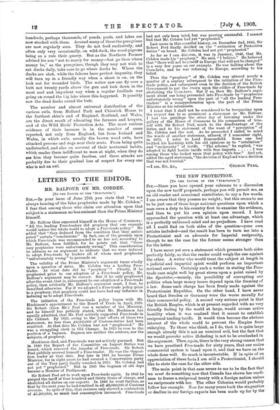'LETTERS TO THE EDITOR.
MR. BALFOUR ON MR. COBDEN.
[TO THE EDITOR OF THZ "SPECTAT0R:1
Sin,—In your issue of June 27th you state that "we are always hearing of the false prophecies made by Mr. Cobden." I fear that among those who claim our attention upon that subject is a statesman no less eminent than the Prime Minister himself.
Mr. Balfour thus expressed himself in the House of Commons : "All the leading Free-traders did prophesy that our example would induce the whole world to adopt a Free-trade policy." He added that "they deduced from the condition that they antici- pated" certain "conclusions." In fact, one of the grounds upon which Free-trade was recommended to us has not, according to Mr. Balfour, been fulfilled, for he points out that "these very prophecies were unfortunately wrong." This consideration he adduces as an argument to indicate that we were induced to adopt Free-trade by leaders all of whom used prophecies "unfortunately wrong" to persuade us.
The validity of the Prime Minister's argument turns wholly upon a question of dates. Mr. Cobden was a leading Free- trader. At what date did he " prophesy " ? Clearly, if he prophesied prior to our adoption of a Free-trade policy, Mr. Balfour's argument may be correct. But if he only prophesied after the event, that is, subsequent to our adoption of a Free-trade policy, then evidently Mr. Balfour's argument must, I fear, be described otherwise. For if we adopted a Free-trade policy prior to a prophecy, that prophecy could not have had any influence in inducing us to adopt Free-trade.
The initiation of the Free-trade policy began with Mr. Huskisson's appointment to the Board of Trade in April, 1823. Sir Robert (then Mr.) Peel was a member of the Ministry, and he himself has publicly stated, what Mr. Huskisson has equally admitted, that Mr. Peel actively supported Free-trade in the Cabinet. By 1825, owing to the joint efforts of these two statesmen, no less than 44,000,000 of Custom-duties had been remitted. At that date Mr. Cobden had not "prophesied." He was a struggling clerk in Old Change. In 1823 he rose to the position of a bagman. Bagmen are neither the authors, nor the subjects, of prophecy.
Huskisson died, and Free-trade was not actively pursued. But in 1840 the Report of the Committee on Import Duties was Issued, .which renewed the impulse of Free-trade. Sir Robert Peel publicly avowed himself a Free-trader. He was the Opposi- tion leader at that date. But late in 1841 he became Prime Minister, for in eight years he had created a Conservative party out of the Tory party finally wrecked in 1833. Mr. Cobden had not yet "prophesied." But in 1841 the bagman of old days became a Member of Parliament.
Sir Robert Peel set to work upon Free-trade again. In 1842 he purged the tariff of four hundred and thirty items of charge, and abolished all duties on our exports. • In 1845 he went further, so that by the next year he had remitted in all .66,000,000 of Customs revenue. In spite of this, that revenue only showed a contraction of £1,200,000, so much had consumption increased. Free-trade had not only been tried, but was proving successfuL I cannot find that Mr. Cobden had yet "prophesied."
Last scene in this eventful history, on December 2nd, 1845, Sir Robert Peel finally decided on the "extinction of Protective duties" on bread. Mr. Cobden had not yet "prophesied."
As far as I can discover, it was in January, 1846, that Mr. Cobden made his "prophecy." He said, "I believe." He believed
that "there will not be a tariff in Europe that will not be changed" in a very few years on our example. He was talking about the Corn-laws, and he was referring to Europe, according to his belief.
Thus the "prophecy" of Mr. Cobden was uttered nearly a quarter of a century subsequent to the initiation of the Free-
trade policy, and subsequent even to the decision of the British Government to put the crown upon the edifice of Free-trade by abolishing the Ccrn-laws. But if so, then Mr. Balfour's argu- ment about our being persuaded into Free-trade by "prophecies unfortunately wrong" upon the part of "all the leading Free- traders" is a misapprehension upon the part of the Primo Minister or his informants.
I trust that I shall not be considered to be trespassing upon the respect due to so prominent a statesman as Mr. Balfour.
I had the privilege the other day of listening under the gallery of the House of Commons to his comparison of him- self with Sir Robert Peel, much to the disadvantage of the
latter, and to his statement of the want of "perception" of Mr. Cobden and the rest. As he proceeded I called to mind the words of another statesman, uttered, if I remember right, in 1879. I refer to Lord Beaconsfield. Some one had twitted his Lordship with his old opinions as to "retaliation" and "reciprocity" of tariffs. "The scheme," he replied, "was
adopted to fight hostile tariffs with free imports I was among those who looked upon that policy with fear." And yet, added the aged statesman, "the decision of England was a decision that was not hurried."










































 Previous page
Previous page